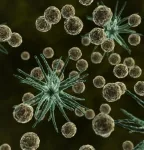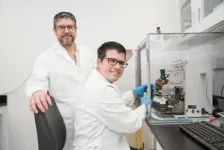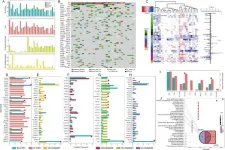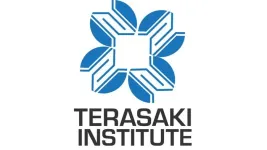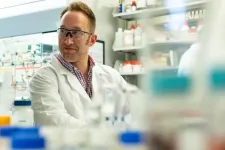(Press-News.org) The Lundquist Institute (TLI) at Harbor-UCLA Medical Center announced today that TLI Principal Investigator, Michael Yeaman, PhD, has been awarded a grant totaling $11.5M from the National Institute of Allergy and Infectious Diseases (NIAID), Department of Health & Human Services. Along with his role at TLI, Dr. Yeaman is Professor of Medicine at UCLA, and Chief, Division of Molecular Medicine at Harbor-UCLA Medical Center.
This new NIH U19 Center program will decode patterns of the human immune system and microbial pathogens that result in infections that are not cleared by antibiotics. In turn, defining such patterns will enable new ways to predict individuals at risk of such persistent infections, and inform best antibiotic regimens for cures. The focus of this U19 is on infections caused by the bacterium Staphylococcus, including methicillin-resistant S. aureus (MRSA) and the invasive fungus, Candida. These pathogens are among highest priorities for public health as determined by the NIAID and Centers for Disease Control & Prevention (CDC).
Dr. Yeaman and team made previous discoveries that laid essential groundwork for this project to find new ways to prevent and treat persistent bloodstream infections. The new research will take an even more innovative approach to this goal. Traditional genetics focus on the sequence of DNA to identify potential correlates of infection and immunity. The new U19 award goes further—by exploring patterns in how DNA is modified beyond sequence in ways that impact immune response and antibiotic efficacy against infection. This exciting frontier of biomedical research is called epigenomics.
Working with Dr. Yeaman will be TLI Investigator Dr. Scott Filler, expert colleagues from the Immunogenetics Center and Department of Bioengineering at UCLA as well as Duke University Medical Center, plus TLI Co-Investigators Dr. Liana Chan and Dr. Marc Swidergall. They will apply powerful immunology and computational methods to detect hidden epigenomic patterns within vast datasets. The ultimate goal of this effort is to accelerate discovery and development of new anti-infective agents, immunotherapies, and vaccines to improve and save lives.
“We will use state-of-the-art technologies in synergistic research to understand human-pathogen interactions driving persistence,” said Dr. Yeaman. “The challenge of infections that are resistant to conventional antibiotics is growing every day—and will pose an increasing threat to public health unless we find new, improved ways to predict, prevent and cure these infections.”
The research of Dr. Yeaman and colleagues at TLI continues to be a beacon of innovation. This new U19 award builds upon his recent $10M NIH U01 grant, which assembled a world-class team of experts to support conceptually new research in epigenomics of MRSA bloodstream infections. This new grant adds to Dr. Yeaman's exceptional track record as the Principal Investigator of research projects totaling over $30M in the past 7 years—each of which advances fundamentally new strategies to prevent and treat infections. His new U19 is the only funded NIH Systems Biology Center focused on infections caused by MRSA and Candida.
“This groundbreaking research underscores the commitment of The Lundquist Institute and Harbor-UCLA to address critical public health challenges that are particularly relevant to the local community and beyond,” said David Meyer, PhD, TLI President & CEO. “The awarding of this grant is more than an institutional triumph; it is a beacon of hope for those battling antibiotic resistant infections, paving the way for potential life–saving treatments. In alignment with the priorities of the National Institutes of Health and Centers for Disease Control & Prevention, Dr. Yeaman's research promises not only to advance scientific understanding but also to translate those findings into tangible improvements in healthcare.”
END
Lundquist Principal Investigator Dr. Michael Yeaman awarded $11.5 million NIAID/HHS grant for innovative research to understand and solve persistent bloodstream infections
The research will apply state-of-the-art science to address antibiotic resistant bloodstream infections caused by Staphylococcus aureus (MRSA) and Candida albicans
2023-08-15
ELSE PRESS RELEASES FROM THIS DATE:
Study finds most infants receiving ICU-level care for RSV had no underlying medical condition
2023-08-15
Most infants admitted to the intensive care or high acuity unit for respiratory syncytial virus (RSV) infections during fall 2022 were previously healthy and born at term, according to a new study reported in JAMA Network Open.
The findings from this study support the use of preventative interventions in all infants to protect them from RSV, the leading cause of lower respiratory tract infections (LRTI) and hospitalizations worldwide.
RSV accounts for about 57,000-80,000 hospitalizations in children younger than 5 years with 1 in 5 RSV-positive hospitalized children being admitted ...
Making sense of life’s random rhythms
2023-08-15
CLEVELAND–Life’s random rhythms surround us–from the hypnotic, synchronized blinking of fireflies…to the back-and-forth motion of a child’s swing… to slight variations in the otherwise steady lub-dub of the human heart.
But truly understanding those rhythms—called stochastic, or random, oscillations—has eluded scientists. While researchers and clinicians have some success in parsing brain waves and heartbeats, they’ve been unable to compare or catalogue an untold number of variations and sources.
Gaining such insight into the underlying ...
Robotic exoskeletons and neurorehabilitation for acquired brain injury: Determining the potential for recovery of overground walking
2023-08-15
East Hanover, NJ. August 15, 2023. A team of New Jersey researchers reviewed the evidence for the impact of robotic exoskeleton devices on recovery of ambulation among individua5ls with acquired brain injury, laying out a systematic framework for the evaluation of such devices that is needed for rigorous research studies. The open access article, "Lower extremity robotic exoskeleton devices for overground ambulation recovery in acquired brain injury – A review” (doi: 10.3389/fnbot.2023/1014616), was published ...
New genetic relations between irritable bowel syndrome and psychiatric diseases discovered
2023-08-15
We have all felt the workings of the so called “brain-gut-axis”, how our intestines get affected, for example, by stress. But still, researchers don’t know a lot about the relation between our gut and our brain.
Research has identified genetic correlations between patients suffering from irritable bowel syndrome (IBS) and psychiatric disorders, such as bipolar disorder.
By using new statistical methods, developed at NORMENT Centre, Post Doctor Markos Tesfaye at the University of Bergen and University of Oslo and his colleagues working under the leadership ...
First-of-its-kind study reveals predictive factors for outcomes of advanced stage AL amyloidosis
2023-08-15
(WASHINGTON, August 15, 2023) – Early improvements in cardiac and hematologic parameters may predict better survival outcomes for patients being treated for stage IIIb AL amyloidosis, a deadly disease with a median survival of 4-6 months caused by abnormal protein buildup, according to new research released today in Blood Advances.
Amyloidosis occurs when normal proteins in the body misfold and form amyloid deposits in vital organs and tissues, which can lead to organ dysfunction, failure, and death. The prognosis for patients with advanced cardiac amyloidosis is extremely poor, ...
Innovative research on schistosomiasis-associated colorectal cancer (SA-CRC) yields unique insights into genetic mutations and treatment implications
2023-08-15
In a study published in the journal Genes & Diseases, researchers from Naval Medical University and Soochow University conducted an in-depth investigation into the genomic landscape of schistosomiasis-associated colorectal cancer (SA-CRC). By utilizing whole exome sequencing on tumor tissues and their non-tumor counterparts obtained from thirty SA-CRC patients diagnosed at Changzheng Hospital from 2014 to 2020, the team successfully identified 2476 nonsynonymous mutations spanning across 1978 genes. This intricate analysis revealed a lower median tumor mutation burden (TMB) in SA-CRC compared to sporadic colorectal cancer (S-CRC), ...
15 students selected amongst hundreds to serve as national Youth Heart Ambassadors
2023-08-15
DALLAS, August 15, 2023 — Fifteen students from coast to coast are joining the American Heart Association, a global force for healthier lives for all, to champion their peers to live heart healthy. Representing a diversity of backgrounds and experiences, these youth selected as national volunteer Youth Heart Ambassadors for the association’s in-school programs, Kids Heart Challenge™ and American Heart Challenge™ will share how heart disease and stroke have impacted their lives while encouraging others to ...
Terasaki Institute for Biomedical Innovation awarded $2.2 million NIH grant to develop advanced treatment for diabetic foot ulcers
2023-08-15
(LOS ANGELES) – August 15, 2023 - A team of researchers from the Terasaki Institute for Biomedical Innovation (TIBI) and the University of Nebraska Medical Center (UNMC) has been awarded a multimillion-dollar grant from the National Institutes of Health to develop a superior, multi-pronged wound treatment for diabetic foot ulcers (DFUs).
DFUs remain a significant complication resulting from dysregulated internal pathophysiological conditions in diabetic patients. The unresolved diabetic wounds affect patients’ quality of life and can result in amputations ...
Novel study shows greater metabolic response to animal versus plant proteins in young and older adults
2023-08-15
Protein from two ounce-equivalents (oz-eq) of animal-based protein foods provides greater essential amino acids (EAA) bioavailability than an equal two oz-eq of plant-based protein foods, according to scientists at Purdue University.1
The protein quality of a food or meal (i.e., the EAA content of a meal) is a major factor in determining how the body can use amino acids for muscle and whole-body protein building.2-4
The Dietary Guidelines for Americans (DGAs) puts an emphasis on consuming a variety of protein foods based on ounce-equivalent portions with similar nutritional ...
Gold buckyballs, oft-used nanoparticle ‘seeds’ are one and the same
2023-08-15
HOUSTON – (Aug. 15, 2023) – Rice University chemists have discovered that tiny gold “seed” particles, a key ingredient in one of the most common nanoparticle recipes, are one and the same as gold buckyballs, 32-atom spherical molecules that are cousins of the carbon buckyballs discovered at Rice in 1985.
Carbon buckyballs are hollow 60-atom molecules that were co-discovered and named by the late Rice chemist Richard Smalley. He dubbed them “buckminsterfullerenes” because their atomic structure reminded him of architect Buckminster Fuller’s geodesic domes, and the “fullerene” family has grown to include dozens of hollow ...
LAST 30 PRESS RELEASES:
Brainwaves of mothers and children synchronize when playing together – even in an acquired language
A holiday to better recovery
Cal Poly’s fifth Climate Solutions Now conference to take place Feb. 23-27
Mask-wearing during COVID-19 linked to reduced air pollution–triggered heart attack risk in Japan
Achieving cross-coupling reactions of fatty amide reduction radicals via iridium-photorelay catalysis and other strategies
Shorter may be sweeter: Study finds 15-second health ads can curb junk food cravings
Family relationships identified in Stone Age graves on Gotland
Effectiveness of exercise to ease osteoarthritis symptoms likely minimal and transient
Cost of copper must rise double to meet basic copper needs
A gel for wounds that won’t heal
Iron, carbon, and the art of toxic cleanup
Organic soil amendments work together to help sandy soils hold water longer, study finds
Hidden carbon in mangrove soils may play a larger role in climate regulation than previously thought
Weight-loss wonder pills prompt scrutiny of key ingredient
Nonprofit leader Diane Dodge to receive 2026 Penn Nursing Renfield Foundation Award for Global Women’s Health
Maternal smoking during pregnancy may be linked to higher blood pressure in children, NIH study finds
New Lund model aims to shorten the path to life-saving cell and gene therapies
Researchers create ultra-stretchable, liquid-repellent materials via laser ablation
Combining AI with OCT shows potential for detecting lipid-rich plaques in coronary arteries
SeaCast revolutionizes Mediterranean Sea forecasting with AI-powered speed and accuracy
JMIR Publications’ JMIR Bioinformatics and Biotechnology invites submissions on Bridging Data, AI, and Innovation to Transform Health
Honey bees navigate more precisely than previously thought
Air pollution may directly contribute to Alzheimer’s disease
Study finds early imaging after pediatric UTIs may do more harm than good
UC San Diego Health joins national research for maternal-fetal care
New biomarker predicts chemotherapy response in triple-negative breast cancer
Treatment algorithms featured in Brain Trauma Foundation’s update of guidelines for care of patients with penetrating traumatic brain injury
Over 40% of musicians experience tinnitus; hearing loss and hyperacusis also significantly elevated
Artificial intelligence predicts colorectal cancer risk in ulcerative colitis patients
Mayo Clinic installs first magnetic nanoparticle hyperthermia system for cancer research in the US
[Press-News.org] Lundquist Principal Investigator Dr. Michael Yeaman awarded $11.5 million NIAID/HHS grant for innovative research to understand and solve persistent bloodstream infectionsThe research will apply state-of-the-art science to address antibiotic resistant bloodstream infections caused by Staphylococcus aureus (MRSA) and Candida albicans
